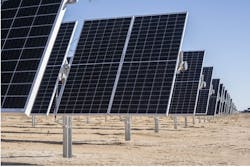Dual Feed: Meta, Enchanted Rock, Microsoft, Silicon Valley Power, Equinix, DPO
"Dual Feed," an industry term reflecting data centers with more than one electrical feed or at least more than one substation, is the title of this periodic feature at DCF, rounding up news updates and insights from the closely related spheres of utility-based and on-site data center power supply and generation, alongside issues related to data center renewable energy sources, providers, and power purchase agreements (PPAs).
Meta's Mesa Data Center to Draw Clean Energy from 300 MW Solar, Battery Project
Last month, we learned that Meta's data center in Mesa, Arizona will soon be supported by new solar energy from the locally-based Salt River Project (SRP) through a contract with U.S. clean energy provider Ørsted.
Under the contract, Meta will receive the majority portion of the solar energy generated by Ørsted's Eleven Mile Solar Center, a 300-megawatt (MW) solar farm and 300 MW, four-hour battery energy storage system currently under construction in Pinal County, Arizona.
Once online in 2024, Meta's Mesa data center project will be the largest solar-plus-battery project on SRP's power grid, and one of the largest battery energy storage systems built in a single phase in the U.S. The solar and stored energy not needed by the Meta data center will be available to SRP's customer base.
In addition to this newly announced project, Meta will also receive an allocation of 50 MW from the 100-MW West Line Solar Facility, which opened earlier this year in Eloy, Arizona to the southeast of Mesa.
Meta will also soon receive a portion of solar energy from the 200-MW Brittlebush Solar Facility in Coolidge, also to Mesa's southeast, which is expected to be online in 2024. These projects will each further enable Meta to reach its 100% renewable energy and net zero goals.
Eleven Mile Solar Center is currently under construction and is expected to be operational in 2024.
Located on over 2,000 acres, the solar and battery energy storage system is estimated to generate $89 million in tax revenue over its lifetime, which will benefit the local school districts, the cities of Coolidge and Eloy, and Pinal County.
The parties said the project has boosted the local economy through the creation of over 300 construction jobs. Ørsted is actively developing renewable energy projects in over 15 states, with a portfolio of 5.7 GW currently operating or under construction across the U.S.
Eleven Mile's storage capacity will contribute to the more than 1,100 MW of large-scale batteries that will be online on SRP's system by the end of 2024.
The new announcement follows SRP's recent Integrated System Plan (ISP) adoption, which incorporated community and customer perspectives to develop a reliable, affordable and sustainable plan to meet growing demand.
SRP's plan prepares to add 7,000 MW of new renewable resources, which includes 6,000 MW of new, large-scale solar resources by 2035.
This is enough solar energy to power more than 1.3 million average size homes and will triple SRP's current extensive portfolio of solar resources scheduled to come online by the end of 2025.
"We are proud to partner with SRP to bring new solar energy to the grid. Access to renewable energy and a strong, reliable grid were an important part of our decision to build in Mesa," said Urvi Parekh, Meta's Head of Renewable Energy. "Meta is committed to having a positive impact on local communities and we're excited to help bring this additional investment and jobs to the area."
SRP is a community-based, not-for-profit public power utility and the largest provider of electricity in the greater Phoenix metropolitan area, serving more than 1 million customers. SRP is also the Phoenix metropolitan area's largest supplier of water, delivering about 750,000 acre-feet annually to municipal, urban, and agricultural water users.
"SRP is pleased to partner with Meta to add more solar to help meet Meta's renewable energy goals and SRP's sustainability commitments," said Bobby Olsen, Chief Planning, Strategy and Sustainability Executive at SRP. "As SRP focuses on responsibly decarbonizing our generation mix, we will need to more than double our power resource capacity by 2035. Strategic partnerships with customers like Meta and renewable energy developers like Ørsted help us get there."
Global clean energy specialist Ørsted develops, constructs, and operates offshore and land-based wind farms, solar farms, energy storage facilities, and bioenergy plants. Citing itself as "the only energy company in the world with a science-based net-zero emissions target as validated by the Science Based Targets initiative," Ørsted has a total U.S. land-based capacity of 5 gigawatts across wind, solar, storage technologies and e-fuels operating or under construction.
"The Eleven Mile Solar Center is Ørsted's first project in Arizona. We are pleased to partner with SRP to deliver clean, affordable power to their customers, including companies like Meta that are prioritizing sustainability," said James Giamarino, Chief Commercial Officer, Americas at Ørsted, adding, "Ørsted is proud to help meet the growing demand for renewable energy in Arizona, provide grid flexibility to SRP through one of the largest battery energy storage systems in the U.S., and partner with innovative companies that share our vision for a clean energy future."
Meta/Facebook unveiled plans for its $800 million data center campus in Mesa, Arizona in 2021 amid concerns surrounding the data center industry’s stewardship of scarce water resources in drought-stricken areas. At the time of the data center announcement, the company outlined three water restoration projects that will restore more than 200 million gallons of water per year in the Colorado River and Salt River basins and help provide greater water security for Arizona.
In 2022, as reported by the Arizona Republic, Facebook parent Meta Platforms announced a new expansion of its Mesa Data Center, with plans to add three new buildings set to increase the campus to five buildings with more than 2.5 million square feet of space. This planned expansion raised Meta’s investment in Arizona to more than $1 billion.
Phoenix has become one of the nation's most dynamic data center growth markets, and is now generally cited as the fifth-largest market for data center capacity in the U.S., trailing Northern Virginia, Silicon Valley, Dallas and Chicago. Apple and EdgeCore operate data centers in Mesa’s Elliott Road Technology Corridor.
Last September, Datacenter Dynamics reported that AWS is planning four new data centers in Mesa in the form of two two-building campuses. Also last September, local NBC affiliate 12 News noted that Google is building a $600 million air-cooled data center in Mesa.
NTT Global Data Centers Americas, Digital Realty, CyrusOne and EdgeConneX are also known to be planning data center projects in Mesa.
Enchanted Rock, U.S Energy to Provide Back-Up Power for Microsoft's San Jose Data Center During Grid Outages
Also last December, Enchanted Rock, a provider of electrical resiliency microgrids, and U.S. Energy, a vertically integrated energy platforms provider proficient in refined products, alternative fuels and environmental credits, announced a partnership to procure renewable natural gas (RNG) for Microsoft's new data center in San Jose during grid outages, and when California's Base Interruptible Power (BIP) is activated.
A resiliency microgrid as provided by Enchanted Rock, utilizing carbon-neutral RNG, will ensure maximum uptime for Microsoft's San Jose Data Center by providing reliable backup power during grid outages. The San Jose data center will use Enchanted Rock's electrical resiliency-as-a-service and ultra-low-emission generators to avoid disruptions to their operations.
"Enchanted Rock has always been committed to using the cleanest fuel available without compromising on reliability for our customers," said Thomas McAndrew, founder and CEO of Enchanted Rock, adding, "After announcing our renewable natural gas solution in 2021 and this particular Microsoft data center project in 2022, we're proud to be taking this important next step toward seeing this key technology in operation. We're pleased to be partnering with U.S. Energy and look forward to showcasing how RNG can be the new standard in providing carbon-neutral, dependable backup power."
For its part in the project, U.S. Energy will deliver RNG sourced from diverted food waste that would have otherwise ended up in landfills. The RNG will be injected upstream in the pipeline to match natural gas usage at the site and reduce overall greenhouse gas emissions, supporting Microsoft's goal to become carbon negative by 2030.
"Energy resilience is crucial with data centers like this one," said U.S. Energy President Mike Koel. "Through our portfolio of 40 renewable natural gas projects, we're able to ensure our customers have the supply needed to meet any additionality requirements. As we continue to grow our portfolio, our partnership with Enchanted Rock will help more organizations take that next step in their carbon reduction goals."
The new agreement also allows for flexibility in the amount of RNG supplied, ensuring the data center is always able to meet its high standards for emissions reduction. The partners say the clean microgrid will also result in 80%-96% lower local emissions than even the strictest EPA diesel standards, which decreases health impacts on nearby communities.
The partners contend the project marks a major milestone in sustainability for data centers. Procurement of the RNG is scheduled to begin in early 2026. Enchanted Rock's microgrid is also California Air Resources Board (CARB) Distributed Generation (DG) compliant, meeting the nation's strictest emission requirements for reciprocating engines.
In his very recent DCF Voices of the Industry essay, Enchanted Rock's Vice President of Data Centers, Brian Jabeck, explains how new variables are impacting grid stability and increasing outage risks for data centers.
Silicon Valley Power Asks for Halt in Data Center Development Planning
A legal brief last December issued by U.S. law firm Davis Wright Tremaine LLP (asking the question, Will AB 50 and SB 410 Actually Result in Faster Electric Service for Data Centers (and Everything Else) in California?) contends that Silicon Valley Power (SVP), the area's municipal utility, will need to nearly double in size to provide enough power capacity to 13 data centers currently approved for service.
SVP stated that 13 data centers currently in the pipeline in Silicon Valley have reserved all the upgraded capacity being created through internal expansion projects and the construction of the CAISO High Voltage Direct Current transmission line project, currently slated to come on-line in 2028 or 2029.
The law firm pointed out that, until the construction of system expansion and transmission projects is further along, SVP is unclear when it will be able to accommodate additional new projects.
The brief noted that SVP's October 10th Quarterly Update indicated 15 additional data center projects seeking service, seven of which have completed System Impact Studies. The law firm said that "the considerable amount of energy required and the current capacity constraints on the SVP and CAISO infrastructure have left the utility unable to serve new or expanding data centers."
As a consequence, SVP issued a memo last November telling all developers to halt plans for data center development projects.
Equinix Fully Allocates $4.9B of Green Bond Proceeds to Support 100+ Green Building Projects, Two PPAs
Last December 20, Equinix announced the full allocation of $4.9 billion in investment-grade green bonds to advance progress toward its near-term, science-based target to become climate neutral by 2030, and to improve the operational eco-efficiency of its business, as stated by the company.
Since 2020, six bond offerings have been issued by Equinix; as of the end of June 2023, the company said that all bonds have been fully allocated.
According to a press release, over the last five years, the bond offerings supported 172 green building projects across 105 sites, 33 energy efficiency projects, and two Power Purchase Agreement (PPA) projects.
Equinix noted that the PPAs support 225 megawatts of renewable energy capacity which are expected to mitigate or avoid 383,300 metric tons of CO2e annually—the equivalent to emissions from more than 85,296 gasoline-powered passenger vehicles driven for one year.
Equinix developed its Green Finance Framework based on the Green Bond Principles and Green Loan Principles, a set of guidelines that promote transparency and integrity in, and advance the standardization of, green debt disclosures.
The Framework aims to increase Equinix's focus on protecting the environment and addressing global climate change through greenhouse gas emissions reductions, increasing resource efficiency, and driving corporate transparency and accountability.
In line with the International Capital Market Association's Green Bond Principles (GBP) 2018 and the Loan Syndications and Trading Association's Green Loan Principles (GLP) 2020, Equinix said it is allocating 100% of the Green Financing net proceeds to a portfolio of Eligible Green Projects which showcase how the company is building and operating sustainably, across sectors including Green Buildings; Renewable Energy; Energy Efficiency; Sustainable Water and Wastewater Management; Waste Management; and Clean Transportation.
Katrina Rymill, SVP Corporate Finance and Sustainability for Equinix, remarked:
"Equinix considers green bonds a valuable tool to raise capital and finance large projects that can increase the sustainability of our business. Our green bonds demonstrate Equinix's continued commitment to design, build and deliver the most reliable, secure and sustainable data center and digital infrastructure possible in order to benefit our customers, the communities in which we operate, our investors, and the planet. Through the allocation of our green bonds, we continue to be able to directly align our financing needs with our sustainability strategy."
Use of proceeds from green bonds issued by Equinix have been allocated toward initiatives including entering PPAs with developers to help build new renewable energy resources on the grids where Equinix operates.
This includes projects like the Rush Springs wind farm, a 125-megawatt wind farm in Grady and Stephens Counties, Oklahoma, where Equinix made a 15-year commitment. These projects are expected to deliver average annual avoidance of more than 218,600 metric tons of CO2e relative to the energy grid in the region.
DPO Signs Behind-the-Meter Wind PPA to Directly Power 100 MW Green Data Center Project
Finally, this month Digital Power Optimization, Inc. (DPO), a developer and operator of green data centers, rang in the new year by announcing the binding execution of a PPA with a major, multinational producer of renewable energy.
DPO said the seller owns a number of large renewable power assets, including multiple 150 MW+ wind farms in Texas. Under the new PPA, DPO and the seller expect data center deployments to reach 100 MW in total size and extend across as many as six of the seller's Texas wind assets.
Unlike most traditional computing facilities procuring clean power through virtual PPAs or offsets, DPO's data centers will draw power behind the meter, directly from the renewable wind generation facilities.
DPO said that funding for the first phase buildout at the initial project site has been secured and data center operations are expected to begin in 2024, with the remaining sites coming online over the following 12-18 months.
DPO's CEO, Andrew Webber, commented:
"We're extremely pleased to have this PPA finalized and the project now officially underway. We have been running a pilot on-site for this power producer for over a year now and have developed an outstanding partnership with them. Together, we crafted a custom and innovative PPA structure which creates zero-cost economic upside for the seller while bringing to life some of the cleanest and most sustainable computing facilities on Earth for DPO's investors and data center tenants."
Privately-held DPO partners with utilities and IPPs to locate data center facilities on-site at power generation plants to directly utilize renewable energy for the operation of HPC/AI and Proof-of-Work computing.
Since 2020, DPO notes it has worked directly with power producers to utilize power-dense computing functions such as Proof-of-Work network security and AI training as a more profitable physical offtake for undervalued power.
DPO has previously developed and operated data center projects behind the meter on wind, solar, hydro, and natural gas plants, as well as grid-connected facilities.
About the Author
Matt Vincent
A B2B technology journalist and editor with more than two decades of experience, Matt Vincent is Editor in Chief of Data Center Frontier.




